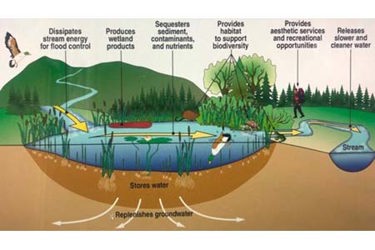Ecological Wastewater Treatment: Nature-Based Solutions For A Cleaner Future
By Amit Ugare

As global populations expand and industrial activities increase, the pressure on freshwater resources has reached critical levels. Wastewater treatment, once a purely mechanical and chemical endeavor, is undergoing a revolution. At the forefront of this shift are ecological wastewater treatment systems — sustainable, nature-based solutions that harness biological processes to purify water while minimizing environmental impact.
This article explores what ecological wastewater treatment is, how it works, its benefits over conventional systems, real-world applications, and its potential to lead us toward a more sustainable and water-secure future.
Understanding Ecological Wastewater Treatment
Ecological wastewater treatment refers to the use of natural processes — such as microbial activity, plant filtration, soil absorption, and sunlight exposure — to clean wastewater. These systems aim to mimic natural ecosystems, using minimal energy and infrastructure while achieving effective pollutant removal.
Unlike traditional wastewater treatment plants, which often rely on intensive mechanical aeration, chemical additives, and high energy consumption, ecological systems prioritize:
- Biodiversity
- Energy efficiency
- Environmental integration
- Resilience to climatic variability
They are often implemented in rural areas, eco-villages, schools, parks, and even urban developments seeking sustainable water management solutions.
Key Nature-Based Wastewater Treatment Methods
1. Constructed Wetlands
Constructed wetlands are one of the most popular forms of ecological treatment systems. These are engineered ecosystems designed to simulate the pollutant-filtering properties of natural wetlands.
There are two main types:
- Surface flow wetlands: Wastewater flows over a shallow, vegetated bed.
- Subsurface flow wetlands: Wastewater flows through a porous medium (like gravel) planted with wetland vegetation.
Plants like cattails, reeds, and bulrushes play a crucial role in nutrient uptake and oxygenation, while microbes in the root zone break down organic pollutants.
2. Living Machines
Invented by ecological designer Dr. John Todd, Living Machines are complex systems that combine a series of tanks, each with different plant, microbial, and animal communities that purify wastewater step by step. These systems are highly visible, often housed in greenhouses, and can serve as educational tools while treating sewage effectively.
3. Lagoons and Oxidation Ponds
These are shallow, open-air ponds where natural processes, including sunlight and microbial activity, degrade pollutants. Algae and bacteria form a symbiotic relationship to break down organic matter, while solar radiation aids in pathogen reduction.
4. Soil Biofilters and Infiltration Systems
These involve filtering wastewater through layers of soil, sand, and gravel. Soil microorganisms play a significant role in degrading organic matter and removing nutrients like nitrogen and phosphorus.
Benefits Of Ecological Wastewater Treatment
Low Energy Consumption
These systems rely on gravity, sunlight, and natural biological processes, requiring minimal external energy inputs compared to conventional systems.
Reduced Operational Costs
Maintenance is straightforward, and there’s little need for chemicals or advanced equipment. This makes it especially suitable for low-income or remote communities.
Environmental Co-Benefits
Constructed wetlands and lagoons provide habitats for birds, insects, and amphibians, boosting local biodiversity. They can also help in carbon sequestration and flood control.
Scalability and Flexibility
Ecological treatment systems can be built to serve individual homes, communities, or even municipal districts. They are also adaptable to seasonal and load variations.
Educational and Aesthetic Value
Living Machines and wetlands can double as green spaces or educational exhibits, turning waste treatment into an opportunity for community engagement and awareness.
Challenges And Limitations
While the benefits are impressive, ecological wastewater systems come with limitations:
- Land Requirements: Systems like wetlands and lagoons require more space than compact mechanical treatment plants, making them less viable in dense urban areas.
- Slower Processing Time: Natural systems take longer to treat wastewater, which may be a concern for areas with high volumes of sewage.
- Climatic Sensitivity: Performance can be affected by temperature, rainfall, and seasonal changes, although designs can be adapted for different climates.
- Limited Industrial Use: Heavy or toxic industrial waste may require more intensive treatment than ecological systems can provide alone.
Despite these challenges, technological advances and hybrid system designs are helping bridge the gap between ecological and conventional treatment methods.
Real-World Applications And Success Stories
Gaviotas, Colombia
This eco-village in Colombia developed a low-energy ecological wastewater system using bamboo and aquatic plants, demonstrating the viability of sustainable sanitation in remote regions.
Sidwell Friends School, Washington D.C.
Their campus features a Living Machine wastewater system that treats all sewage onsite, reuses the water for toilets and irrigation, and doubles as a teaching tool for students.
Auroville, India
In this experimental township focused on sustainable living, constructed wetlands and soil biofilters treat greywater and blackwater, supporting agricultural reuse and reducing groundwater extraction.
The Role Of Policy And Innovation
Governments, NGOs, and environmental organizations are increasingly recognizing the potential of nature-based solutions. The United Nations and World Bank have both promoted ecological wastewater treatment as part of climate-resilient infrastructure strategies.
Policy shifts that prioritize decentralized water treatment, green infrastructure, and circular water systems are crucial for scaling these technologies. Investment in research, especially on microbial ecology and plant performance, is helping optimize these systems for diverse climates and waste profiles.
Conclusion: A Greener Path To Clean Water
Ecological wastewater treatment systems present a compelling alternative to conventional, energy-intensive methods. They align with sustainability goals by conserving energy, supporting biodiversity, and integrating seamlessly into local ecosystems. As water scarcity intensifies and environmental concerns take center stage, these nature-based solutions offer a resilient, cost-effective, and ecologically sound approach to wastewater management.
For communities, governments, and industries looking to build a cleaner, greener future, embracing ecological wastewater treatment is not just an environmental necessity — it’s a transformative opportunity.
Source: https://www.transparencymarketresearch.com/ecological-wastewater-treatment-market.html
